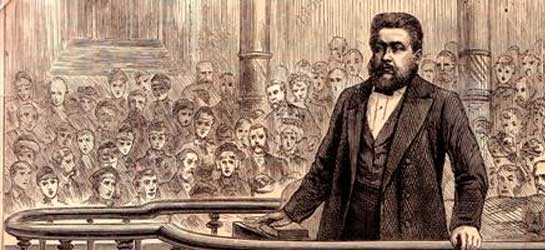I hope I may own in sincerity that my heart’s desire unto God, and the chief design of my life . . . are, that mortification and universal holiness may be promoted in my own and in the hearts and ways of others, to the glory of God, that so the Gospel of our Lord and Savior Jesus Christ may be adorned in all things. – John Owen
Precisely Packed
Meaning moves. Wisdom walks. And precision propels.
Which is why I love definitions. Sometimes you stumble across the definition of a particular term or action that opens the mind to an oh so powerful nuance. I’ve seen this happen in my own ministry when it comes to hearing a pithily packed definition of preaching.
3 LEGS OF UNDERSTANDING
Here are three definitions of preaching that have most shaped my practice:
- “To know truth as it should be known, to love it as it should be loved, and then to proclaim it in the right spirit, and in its proper proportions.” – Charles Spurgeon, An All Round Ministry, p. 8.
- An expositional sermon is a sermon in which “the point of the passage is the point of the sermon, applied to the life of the congregation.” – Mark Dever, quoted in Leeman, Reverberation, 114.
- “Expositional preaching is empowered preaching that rightly submits the shape and emphasis of the sermon to the shape and emphasis of the biblical text.” – David Helm, Expositional Preaching, 13.
I wonder how these might impact your preaching and sermon preparation. Meditate on them, squeeze out any nuance, and let them compel you to a faithful handling of God’s word.
3 Books Every Pastor Should Read: On Biblical Theology
Books are some of the best friends a pastor can have. How to know which friends to have is quite difficult, for as the inspired Preacher said, “Of making many books there is no end” (Ecclesiastes 12:12). Every so often I recommend three books for pastors on a given topic, hoping the suggestions might hone your book budget.
A popular renaissance in the field of biblical theology came at the turn of the century. Seminaries moved to offer PhDs in Biblical Theology and countless resources on the discipline have poured out of publishing houses. The saturation of books can make it difficult for a young pastor to know where to begin. Here are a few titles undoubtedly worth your time and money.
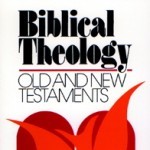 Biblical Theology by Geerhardus Vos. If Gabler is the grandfather of biblical theology as a theological enterprise, Vos surely is the Father of Biblical Theology. This volume is the fountainhead for the plethora of resources we’ve seen over the last few decades. Simply put, you have to reckon with the Dutchman who taught at Princeton Seminary in it’s twilight of grandeur. Vos is not easy by any stretch of the imagination, but the strain on your brain will be oh so worth it.
Biblical Theology by Geerhardus Vos. If Gabler is the grandfather of biblical theology as a theological enterprise, Vos surely is the Father of Biblical Theology. This volume is the fountainhead for the plethora of resources we’ve seen over the last few decades. Simply put, you have to reckon with the Dutchman who taught at Princeton Seminary in it’s twilight of grandeur. Vos is not easy by any stretch of the imagination, but the strain on your brain will be oh so worth it.
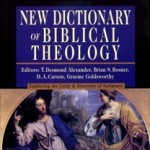 New Dictionary of Biblical Theology edited by Alexander, Rosner, Carson, and Goldsworthy. Yes, this is more an encyclopedic resource than page turner, but its insights are often stunning. As IVP says, “At the heart of this work is an A-to-Z encyclopedia of over 200 key biblical-theological themes such as atonement, creation, eschatology, Israel, Jesus Christ, the kingdom of God, redemption, suffering, wisdom and worship.” A BT benchmark that ought to be in every pastor’s study.
New Dictionary of Biblical Theology edited by Alexander, Rosner, Carson, and Goldsworthy. Yes, this is more an encyclopedic resource than page turner, but its insights are often stunning. As IVP says, “At the heart of this work is an A-to-Z encyclopedia of over 200 key biblical-theological themes such as atonement, creation, eschatology, Israel, Jesus Christ, the kingdom of God, redemption, suffering, wisdom and worship.” A BT benchmark that ought to be in every pastor’s study.
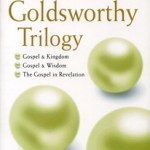 The Goldsworthy Trilogy by Graeme Goldsworthy. Paternoster did everyone a favor by bringing three excellent Goldsworthy books – “Gospel & Kingdom,” “Gospel & Wisdom,” and “The Gospel in Revelation” – into one volume. Few people have been able to better the Australian’s brilliant summation of Scripture’s storyline as “God’s people, in God’s place, under God’s rule.” The “Gospel & Kingdom” work is particularly helpful.
The Goldsworthy Trilogy by Graeme Goldsworthy. Paternoster did everyone a favor by bringing three excellent Goldsworthy books – “Gospel & Kingdom,” “Gospel & Wisdom,” and “The Gospel in Revelation” – into one volume. Few people have been able to better the Australian’s brilliant summation of Scripture’s storyline as “God’s people, in God’s place, under God’s rule.” The “Gospel & Kingdom” work is particularly helpful.
HONORABLE MENTIONS
Dominion and Dynasty: A Study in Old Testament Theology by Dempster. A magnificent evaluation of how OT passages find meaning and significance within the overall story of “dominion and dynasty.”
New Testament Biblical Theology: The Unfolding of the Old Testament in the New by Beale. Rightly called a “magnum opus,” this work will do for your understanding of the NT what Dempster does for the OT.
God’s Big Picture: Tracing the Storyline of the Bible by Roberts. An admitted simplification of Goldsworthy for the average church member, but it’s an excellent distillation. And a wonderful discipling resource!
Check out my past suggestions in the “3 Books Every Pastor Should Read” series here.
A Hymn to Sing on the Way to Heaven
Our churches needs psalms, hymns, and spiritual songs that speak to the full range of human experience. We need songs for seasons of lament, praise, distress, and hope.
One hymn of hope worth reclaiming today is Samuel Stennett’s “On Jordan’s Stormy Banks I Stand.”
Let me commend to you the Jars boys’ version for your church. May it help your people set their gaze toward their heavenly city.
On Jordan’s stormy banks I stand
And cast a wishful eye
To Canaan’s fair and happy land
Where my possessions lie
All o’er those wide extended plains
Shines one eternal day
There God, the Son forever reigns
And scatters night away
I am bound, I am bound, I am bound for the Promise Land
I am bound, I am bound, I am bound for the Promise Land
No chilling wind nor poisonous breath
Can reach that healthful shore
Where sickness, sorrow, pain and death
Are felt and feared no more
When shall I see that happy place
And be forever blessed
When shall I see my Father’s face
And in His bosom rest
Click here to find other hymns and arrangements worth your attention.
Prayerlessness is the most subtle disclosure of our independence from God and is our depraved heart’s declaration of sovereignty. – Paul Tautges
Do You Have Friends in Ministry?
Last week I sat down with three brothers in ministry, two of whom are twice my age, to put down plans for a pastoral fellowship we coordinate.
Three hours later we scatted to our various posts having done little planning, but oh! those hours were not wasted. As the bottomless chips and salsa kept coming we bantered back and forth about theological matters and counseled one another through pastoral issues.
Such spiritual camaraderie does wonders for the pastor’s soul and ministry.
Pastor, do you have any comrades in the gospel ministry?
I doubt you need any experiential encouragement to find some soul-brothers in ministry. So let me let good Dr. Piper give you some historical encouragement on the matter.
PASTORAL COMRADES
At the 2011 Desiring God Pastor’s Conference Piper delivered his biographical address on Robert Murray M’Cheyne entitled, “He Kissed the Rose and Felt the Thorn: Living and Dying in the Morning of Life.”
40 minutes into the talk he addressed the life-giving, ministry-expanding friendship M’Cheyne had with Andrew Bonar and Alexander Somerville. His eight minute meditation is worth prayerful attention. You can listen to it below:
I found the final few minutes particularly challenging, so on the outside chance you don’t have eight minutes, I’d invite you to consider the following section from Piper’s manuscript.
“Your impact in the world will be exponentially increased through these kinds of friendships. Van Valen captured this exponential effect of McCheyne’s band of brothers like this:
McCheyne’s ‘school’ tended to be more spiritual than theological. Their influence was evident not so much in the college halls or the study rooms of the theological students; they distinguished themselves not in controversy, when it concerned the fight against error, but their contribution was more effective in spreading the classical teaching on grace to the general public. Their task was especially focused on evangelization and revivals and didn’t exist to give substance to theological structures. Hence their strength lay in their preaching, which distinguished itself from the preaching of others “in demonstration of the Spirit and of power”.
“Bands of brothers—comrades in a great cause—are more than the sum of their parts. May God link your arms theologically, spiritually, personally for the sake of this exponential effect.”
Preachers as Window Washers
2 Corinthians 4:1-6 is a zenith of apostolic instruction on true preaching.
Pastors would do well to memorize 4:5, where Paul says, “What we proclaim is not ourselves, but Jesus Christ as Lord, with ourselves as your servants for Jesus’ sake.”
HERALDING GOD’S WORD
The verb here for “proclaim” is κηρύσσω, which describes the tone of preaching as “heralding.” If you’ve rightly understood that encountering God’s word through preaching a battle of cosmic proportions, it won’t surprise you to know that “heralding” is military language.
A herald is in times of war what an ambassador is in times of peace . . . The herald would go into enemy territory ahead of an advancing army to warn the enemy of certain destruction unless they accepted the proffered terms for peace. A gospel herald stands with God’s word in hand and proclaims, “Hear ye! Hear ye! Jesus Christ is Lord. All who swear allegiance to his throne will receive eternal life.”
We preachers must ask our unbelieving hearers, “What will you do with this announcement that Jesus is Lord?” Satan wants to blind their eyes in unbelief and rebellion (2 Cor. 4:4), to keep them as part of His army. But the gospel, the good news of life, is contained in those four words of 4:5: Jesus Christ is Lord. And thus we herald the King who lived perfectly, died sacrificially, rose victoriously, and now reigns supremely. We cry out for them to cry out to Him in faith and repentance. The two eyes of faith and repentance are the only way they will ever see the Son in all his glory. And so we call them to swear allegiance through their seeing of Him.
PREACHING IS WINDOW WASHING
Brother pastor, do not miss the negation contained in 4:5, “. . . what we proclaim is not ourselves,” but Jesus Christ. If you want to be a faithful preacher, rid yourself of notions to use the preaching of God’s word as an occasion to herald yourself. It is dangerous to put much of yourself into a sermon. Sure, short illustrations from personal experience can be useful at times, but such a desire to illuminate truth can easily become an exercise in proclaiming self.
And we dare not tamper with God’s word in that way.
One helpful way of thinking about this is through the analogy of preachers as window washers. God’s word is a window that reveals the glory of Christ. When we stand behind the sacred desk we are to hold up the window of God’s word, and cry out, “Look unto Him! See Him! Behold the glory of God in the face of Jesus Christ.” Our job as preachers then is to scrub that window clean by the clear proclamation of Scripture (2 Cor. 4:2; cf. Col. 4:4).
Putting too much of oneself into the sermon is tantamount to scrubbing the window with clouds of mud and then covering it up with the foil of personal vanity. Our churches won’t see Christ through such dirt. Renounce such disgraceful and underhanded means and herald God’s word by “the open statement of the truth.”
Preacher, you are a window washer. Make the window plain and clear, so they might see Christ!
This post is adapted from my recent sermon, “Preach the Word,” on 2 Corinthians 4:1-6.
A Lord’s Day Reminder for Preachers
To read Spurgeon’s sermons is to hear and see, as Piper once said, “a bee buzzing around one tree: the cross of Christ.”
In a lecture to his pastoral students entitled “Sermons Likely to Win Souls” Spurgeon said, “People have often asked me, ‘What is the secret of your success?” He answered,
I have no other secret but this, that I have preached the gospel, – not about the gospel, but the gospel – the full, free, glorious gospel of the living Christ who is the incarnation of the good news. Preach Jesus Christ, brethren, always and everywhere; and every time you preach be sure to have much of Jesus Christ in every sermon.
May it be so in pulpits all across the land this day.
Recents Reads
I love to read. By God’s grace I am a pretty fast reader; I usually read a couple books each week. I find it helpful to summarize my thoughts on each book and I offer those thoughts in the hope that you will be encouraged to either read or pass over the given title.
 Andrew Bonar: Life and Diary.I recently reread Bonar’s edited volume on Robert Murray M’Cheyne and noticed on the dust jacket a commendation of Bonar’s own “Life and Remains.” The Church of England Newspaper proclaimed, “The whole volume is a devotional gem, far removed from the passing superficiality of many of its modern counterparts. Its very profundity and realism will help a disheartened Christian and revive the weary ministry.” I can testify to such sentiment. God used this window into Bonar’s soul mightily in my life. Like his great friend M’Cheyne, Bonar was convinced that “it is not great talents God blesses so much as great likeness to Jesus” and that “unholiness lies at the root of our little success.” Bonar has taught me much about humility, self-denial, and the primary of holy prayer. These are lessons I need to relearn daily and so I expect drink from Bonar’s diary with great frequency.
Andrew Bonar: Life and Diary.I recently reread Bonar’s edited volume on Robert Murray M’Cheyne and noticed on the dust jacket a commendation of Bonar’s own “Life and Remains.” The Church of England Newspaper proclaimed, “The whole volume is a devotional gem, far removed from the passing superficiality of many of its modern counterparts. Its very profundity and realism will help a disheartened Christian and revive the weary ministry.” I can testify to such sentiment. God used this window into Bonar’s soul mightily in my life. Like his great friend M’Cheyne, Bonar was convinced that “it is not great talents God blesses so much as great likeness to Jesus” and that “unholiness lies at the root of our little success.” Bonar has taught me much about humility, self-denial, and the primary of holy prayer. These are lessons I need to relearn daily and so I expect drink from Bonar’s diary with great frequency.
 The Soul-Winner: Advice on Effective Evangelism by Spurgeon. The Prince of Preachers would surely be at, or near, the top of any list ranking church history’s most effective evangelists. Winning souls was his passion and this volume aims to instill that passion in every Christian. The first six chapters contain lectures to his Pastor’s College students and these will be most valuable to pastors. The rest of the volume consists of various addresses or sermons on the titular topic delivered to Sunday-school teachers, open-air preachers, and church members of the Tabernacle. Spurgeon sparkles with typical pithiness and sound wisdom, and the two chapters on “Qualifications for Soul-Winning” ought to be required reading for every church leader. Highly recommended!
The Soul-Winner: Advice on Effective Evangelism by Spurgeon. The Prince of Preachers would surely be at, or near, the top of any list ranking church history’s most effective evangelists. Winning souls was his passion and this volume aims to instill that passion in every Christian. The first six chapters contain lectures to his Pastor’s College students and these will be most valuable to pastors. The rest of the volume consists of various addresses or sermons on the titular topic delivered to Sunday-school teachers, open-air preachers, and church members of the Tabernacle. Spurgeon sparkles with typical pithiness and sound wisdom, and the two chapters on “Qualifications for Soul-Winning” ought to be required reading for every church leader. Highly recommended!
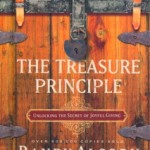 The Treasure Principle by Randy Alcorn. Alcorn’s thesis is simple when it comes to money: “You can’t take it with you, but you can send it on ahead.” It’s all built on Matthew 13:44 and the man who finds a treasure hidden in a field and, in his joy, sells everything he has to purchase the field. So the book is simple and biblical. To those we must add, “Wise.” Over and over Alcorn deposits little nuggets of wisdom into the souls of his readers, such as, “My heart always goes where I put God’s money,” and, “Giving is the only antidote to materialism.” Not many “bestsellers” of the last decade are worth your investment, but The Treasure Principle is one of the few. I imagine every penny you spend on it will cause many more to stretch into eternity.
The Treasure Principle by Randy Alcorn. Alcorn’s thesis is simple when it comes to money: “You can’t take it with you, but you can send it on ahead.” It’s all built on Matthew 13:44 and the man who finds a treasure hidden in a field and, in his joy, sells everything he has to purchase the field. So the book is simple and biblical. To those we must add, “Wise.” Over and over Alcorn deposits little nuggets of wisdom into the souls of his readers, such as, “My heart always goes where I put God’s money,” and, “Giving is the only antidote to materialism.” Not many “bestsellers” of the last decade are worth your investment, but The Treasure Principle is one of the few. I imagine every penny you spend on it will cause many more to stretch into eternity.
 The Silkworm by Robert Galbraith. JK Rowling returns to detective work under her chosen pseudonym of Robert Galbraith. Just over one year ago Rowling introduced readers to Cormoran Strike, a private investigator who prowls the streets of London with tenacity and skill, in The Cuckoo’s Calling. That delightful page-tuner was made all the more interesting in that the reader was able to sense something of Rowling’s inner thoughts on celebrity and fame, as the novel’s central victim was a world renown model. The Silkworm is a satisfying continuation of the Srike series; the pages fly and this time we hear Rowling’s thoughts on authors and publishing. One Leonora Quine calls on Strike to find her husband, a somewhat famous author, whose gone missing. Owen Quine eventually turns up as the victim of a grotesque murder and Strike moves to ensuring the Mrs. Quine isn’t wrongly accused as his murderer. Quine’s last – and unpublished – work, Bombyx Mori, holds the all clues to his death. The ensuing investigation is engrossing.
The Silkworm by Robert Galbraith. JK Rowling returns to detective work under her chosen pseudonym of Robert Galbraith. Just over one year ago Rowling introduced readers to Cormoran Strike, a private investigator who prowls the streets of London with tenacity and skill, in The Cuckoo’s Calling. That delightful page-tuner was made all the more interesting in that the reader was able to sense something of Rowling’s inner thoughts on celebrity and fame, as the novel’s central victim was a world renown model. The Silkworm is a satisfying continuation of the Srike series; the pages fly and this time we hear Rowling’s thoughts on authors and publishing. One Leonora Quine calls on Strike to find her husband, a somewhat famous author, whose gone missing. Owen Quine eventually turns up as the victim of a grotesque murder and Strike moves to ensuring the Mrs. Quine isn’t wrongly accused as his murderer. Quine’s last – and unpublished – work, Bombyx Mori, holds the all clues to his death. The ensuing investigation is engrossing.
The book is longer than it needs to be and the ending is anticlimactic, yet Rowling succeeds with aplomb in matters of character development and nuanced perspective. The Strike series will supposedly stretch to seven novels and I am eager for the third to drop.
 The Shadow of the Wind by Carlos Ruiz Zafon. I can’t remember the last fiction book I read that was as impressive a read as The Shadow of the Wind. The book begins in 1945 in Barcelona as a young boy named Daniel journeys to The Cemetary of Forgotten Books with his bookseller father. Daniel eventually chooses – mostly for its attractive binding – the eponymously titled ”The Shadow of the Wind,” by an obscure Spanish writer, Julián Carax. And little Daniel’s life changes forever. As one review says, “The main story is too zestfully convoluted to set out in any detail and allow space for the lush side stories that weave through it.” Suffice it to say, Daniel’s subsequent search for Carax is like a lovely Matryoshka doll filled with thrillingly tragedies and alluring victories. Although I uncovered the book’s twist almost from the outset, Zafon kept my attention with the dialogue – oh, the dialogue! The conversations regularly sing with almost perfect pitch. Stephen King sums it all up quite well, “This is one gorgeous read.”
The Shadow of the Wind by Carlos Ruiz Zafon. I can’t remember the last fiction book I read that was as impressive a read as The Shadow of the Wind. The book begins in 1945 in Barcelona as a young boy named Daniel journeys to The Cemetary of Forgotten Books with his bookseller father. Daniel eventually chooses – mostly for its attractive binding – the eponymously titled ”The Shadow of the Wind,” by an obscure Spanish writer, Julián Carax. And little Daniel’s life changes forever. As one review says, “The main story is too zestfully convoluted to set out in any detail and allow space for the lush side stories that weave through it.” Suffice it to say, Daniel’s subsequent search for Carax is like a lovely Matryoshka doll filled with thrillingly tragedies and alluring victories. Although I uncovered the book’s twist almost from the outset, Zafon kept my attention with the dialogue – oh, the dialogue! The conversations regularly sing with almost perfect pitch. Stephen King sums it all up quite well, “This is one gorgeous read.”
Tolle lege!
Click here to find other entries in the Recent Reads series.
A Double Portion for Your Hearers

A few weeks ago I mentioned how faithful attendance to their church’s corporate gathering is the most powerful, yet least talked about, way church members can encourage their pastor.
Yet, as every pastor knows, there are two menacing enemies to such encouragement; one is named Summer, and that other goes by the moniker of Holiday.
We know the feeling full well. The school year ends and it’s not uncommon to find the chairs or pews a bit less full in the warm months of the year. Or a national holiday decides to land on a Saturday or Sunday and your flock scatters to four winds of family, fun, vacation, and party.
Summer and Holiday can steal the joy of any preacher.
But they need not succeed in such thievery.
A DOUBLE PORTION OF BLESSING
Earlier this week I listened to an old Piper sermon on Charles Simeon and came across the best way to combat the blues preachers often feel when Summer and Holiday decide to show up.
Simeon face peculiar opposition for much of his ministry. As a way to protest his appointment at Trinity Church the church locked the pew doors on Sunday mornings. The pewholders refused to come and refused to let others sit in their personal pews. Simeon set up seats in the aisles and nooks and corners at his own expense. But the churchwardens took them out and threw them in the churchyard.
This happened for over ten years. And here’s what Simeon said about such discouragement,
In this state of things I saw no remedy but faith and patience. The passage of Scripture which subdued and controlled my mind was this, ‘The servant of the Lord must not strive.’ It was painful indeed to see the church, with the exception of the aisles, almost forsaken; but I thought that if God would only give a double blessing to the congregation that did attend, there would on the whole be as much good done as if the congregation were doubled and the blessing limited to only half the amount. This comforted me many, many times, when, without such a reflection, I should have sunk under my burden. (Moule, 39)
SIMEON’S WISDOM FOR TODAY
The next time time Summer and Holiday creep up on you let Simeon’s wisdom drive you to pray for God to give a double blessing to the congregation that does attend. Who knows? Maybe, in His abounding kindness, there will be as much good done as if the congregation were doubled and the blessing limited to only half the amount.




